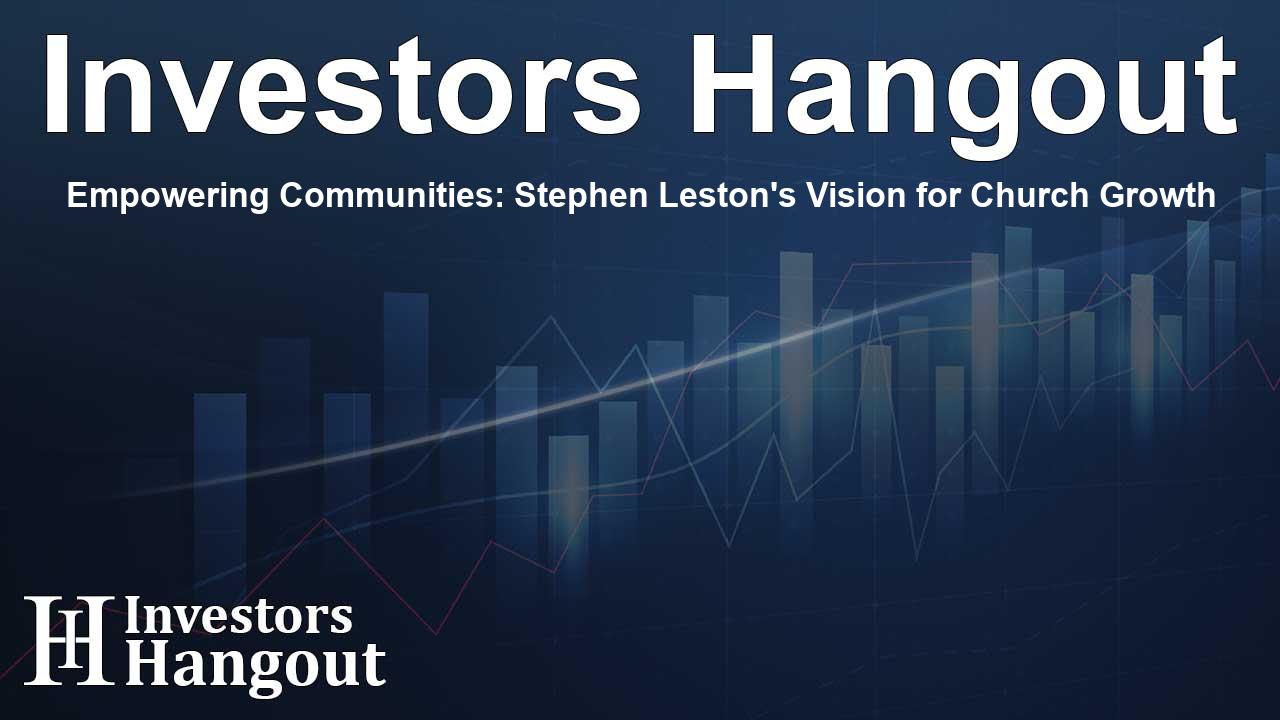Empowering Communities: Stephen Leston's Vision for Church Growth

Empowering Communities Through Trust-Based Church Planting
In a rapidly changing world, the role of faith-based communities has never been more essential. Stephen Leston, a seasoned pastor and church planting expert, emphasizes the transformation that occurs when communities engage with churches not as mere programs, but as places of genuine connection. His new book, "From the Ground Up: The Relational Art of Church Planting," serves as an essential resource for those interested in establishing deep-rooted congregations that empower local communities.
The Importance of Slowing Down
Leston’s approach fundamentally challenges the conventional fast-paced methods of church planting. He argues that practitioners need to slow down to foster meaningful relationships within communities. This isn't just a suggestion, but a pivotal strategy that can lead to a successful planting process, resulting in vibrant and active churches. Through immersive experiences, planters learn that building trust takes time, but it’s an investment that pays dividends in community ownership and commitment.
Building Trust
Trust is the cornerstone of any healthy relationship, particularly in church planting. Leston notes that churches should emerge from the community rather than be imposed upon it. By prioritizing relationships over immediate results, plant leaders can effectively work alongside locals to foster indigenous church formations. The goal is nurturing relationships that allow local leaders to arise naturally, ensuring these churches reflect the culture and values of their communities.
The Relational Art of Church Planting
According to Leston, successful church planting hinges on authenticity and relational depth. His framework, which includes eight phases of engagement, encourages planters to assess their interactions and adapt accordingly. For instance, building a network of relationships within the community is paramount; this means investing time to understand local dynamics, challenges, and cultures. Leston believes that when church planters immerse themselves in their surroundings, they become better equipped to help communities develop their faith-based initiatives.
Learning from Experience
Leston draws from his extensive background, which spans over three decades in pastoral roles, to craft his teachings. His insights are gleaned from real-world experiences where patience and relationship-building have borne fruit. He encourages aspiring church leaders to adopt this perspective: "Go slow to go fast." This principle serves as a reminder that thoughtful, relationship-driven practices can lay the groundwork for sustainable church growth.
Local Ownership of Churches
A crucial aspect of Leston's philosophy is local ownership. He illustrates that when communities feel ownership over their churches, they are far more likely to invest in them fully. This can be particularly transformative in environments where skepticism towards external influences predominates. By recognizing indigenous leadership, churches can evolve in a way that resonates with their communities, ensuring longevity and relevance.
Future Endeavors and Ongoing Learnings
Leston isn't stopping with this book; he envisions continuing his mission to equip future church planters with the tools they need to succeed in increasingly complex environments. His commitment to sharing knowledge and providing resources reflects a heart for service, aiming to bolster both the church and the broader community fabric.
Frequently Asked Questions
What is the main message of Stephen Leston's book?
The book emphasizes building trust and relationships as key components of effective church planting, shifting focus from quick launches to deeper community engagement.
How does Leston's approach differ from traditional church planting methods?
Leston advocates for a slower, relationship-driven approach, prioritizing local ownership over rapid program implementation, fostering sustainable growth instead.
What are the key phases in Leston's framework?
His framework includes eight phases designed to guide church planters in adapting their strategies to the unique dynamics of their communities.
Why is local leadership emphasized in church planting?
Local leadership fosters community engagement and ownership, making churches more aligned with the cultural and spiritual needs of their members.
What can aspiring church planters learn from Leston’s experiences?
They can learn the importance of patience, understanding, and cooperation with local communities to create lasting faith-based organizations.
About The Author
Contact Owen Jenkins privately here. Or send an email with ATTN: Owen Jenkins as the subject to contact@investorshangout.com.
About Investors Hangout
Investors Hangout is a leading online stock forum for financial discussion and learning, offering a wide range of free tools and resources. It draws in traders of all levels, who exchange market knowledge, investigate trading tactics, and keep an eye on industry developments in real time. Featuring financial articles, stock message boards, quotes, charts, company profiles, and live news updates. Through cooperative learning and a wealth of informational resources, it helps users from novices creating their first portfolios to experts honing their techniques. Join Investors Hangout today: https://investorshangout.com/
The content of this article is based on factual, publicly available information and does not represent legal, financial, or investment advice. Investors Hangout does not offer financial advice, and the author is not a licensed financial advisor. Consult a qualified advisor before making any financial or investment decisions based on this article. This article should not be considered advice to purchase, sell, or hold any securities or other investments. If any of the material provided here is inaccurate, please contact us for corrections.
